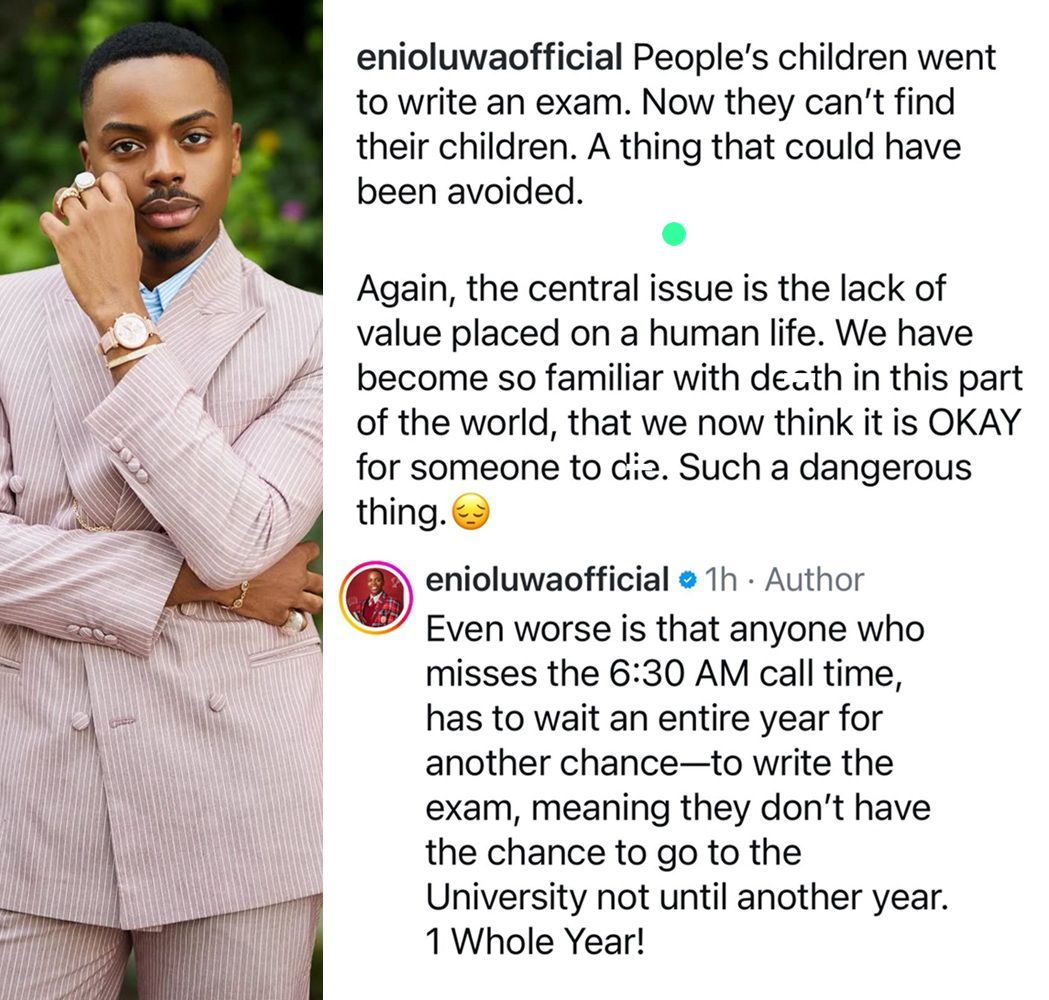
Enioluwa Slams Exam Body Over 6:30 A.M. Exam Time: 'We No Longer Value Human Life'

In a passionate outcry that has quickly captured national attention, popular influencer Enioluwa Adeoluwa has taken to social media to condemn the decision of an unnamed examination body to schedule a crucial national exam at an unreasonably early hour of 6:30 a.m. In a series of emotional posts shared on his official Instagram account, Enioluwa did not hold back as he expressed deep concern over the consequences of such a poorly thought-out decision, highlighting the tragic realities faced by young students and their families.
According to Enioluwa, several students who set out in the early hours to meet the 6:30 a.m. exam call time have gone missing, sparking panic and heartbreak among parents who sent their children out for what should have been a simple academic exercise. "People’s children went to write an exam. Now they can’t find their children. A thing that could have been avoided," he wrote, his words laced with pain and frustration. His post instantly resonated with thousands who recognized the bigger issue he was pointing to: a systemic failure that places little or no value on human life.
Enioluwa’s criticism goes beyond the inconvenience of an early morning exam. He bravely tackled the deeper, more sinister problem of societal desensitization to death and suffering in Nigeria. "Again, the central issue is the lack of value placed on a human life. We have become so familiar with death in this part of the world that we now think it is OKAY for someone to die. Such a dangerous thing," he lamented. His powerful words cut deep into the hearts of many Nigerians who have long watched a culture of negligence, corruption, and impunity erode the dignity and worth of human life.
The decision to schedule an exam at such a dangerous time, he argued, reflects a deep-seated disregard for the safety and well-being of young Nigerians. Moving through cities and rural areas at such an hour exposes students to countless risks, from road accidents and kidnappings to violent attacks. In a country where security remains a major concern and where basic infrastructure such as street lighting and reliable public transportation are lacking, expecting teenagers to travel before dawn for an academic requirement is, in many people’s eyes, nothing short of reckless.
Making matters worse, Enioluwa pointed out, is the cruel policy that anyone who misses the 6:30 a.m. call time would have to wait an entire year for another chance to write the exam. "Even worse is that anyone who misses the 6:30 a.m. call time has to wait an entire year for another chance — meaning they don't have the chance to go to the university not until another year. One whole year!" he exclaimed. The sheer weight of that statement captured the devastating consequences for students who, due to no fault of their own, might miss their exam slot. One missed exam could mean watching an entire year of dreams, ambitions, and hard work slip away in an instant.
The reaction to Enioluwa’s call-out was swift and massive. Social media erupted with comments from parents, educators, students, and activists who echoed his outrage. Many shared their own horror stories of struggling to reach exam centers in the dark or narrowly escaping accidents while trying to meet absurd call times. The common thread among the responses was a cry for urgent reform in how national examinations are organized and a demand for accountability from those responsible for endangering young lives.
Public commentators and education stakeholders have since weighed in on the conversation, some defending the need for early exams to ensure time for coordination and logistics, but many more agreeing that no logistical excuse could justify putting lives at risk. Critics argue that if the system were better organized, exams could be staggered, transportation arrangements could be improved, and greater consideration could be given to the unique challenges facing Nigerian students.
For many Nigerians, Enioluwa’s bold stance on the issue reflects a growing impatience with a culture of mediocrity and disregard. More and more young voices are rising to challenge the status quo, refusing to accept the narrative that suffering and sacrifice must accompany every aspect of life, from education to healthcare to daily survival. Enioluwa’s platform as a popular figure among the youth only amplifies this message, giving visibility to concerns that might otherwise be ignored by those in power.
At the core of his message is a simple but powerful plea: human lives must be treated with dignity and respect. It is not enough to pursue academic excellence if the cost is the safety and sanity of the students themselves. It is not enough to boast about increasing educational enrollment if the very system designed to educate children instead traumatizes and endangers them. True progress demands that policies be crafted with empathy, foresight, and a genuine commitment to the welfare of every citizen, especially the young.
As the debate continues to rage online and beyond, calls are growing louder for the examination body in question to immediately review its policies and offer explanations — and most importantly, solutions. Many are demanding that the body issue a public apology, provide support for families affected by the chaos, and develop safer, more student-friendly examination practices moving forward.
Enioluwa’s heartfelt outrage serves as a mirror to the nation’s conscience. In speaking up, he not only defended the students directly affected by this tragedy but also challenged a whole system to do better, to be better. His words have become a rallying cry for a generation that is tired of waiting for change and is now determined to create it.
In a country where bad news often feels like a daily norm, the courage of voices like Enioluwa’s reminds everyone that silence is complicity. And that perhaps the greatest hope for Nigeria lies in a new generation that refuses to accept that losing human lives is simply part of the cost of doing business. A generation that knows the value of a single life — and demands that those in authority know it too.


